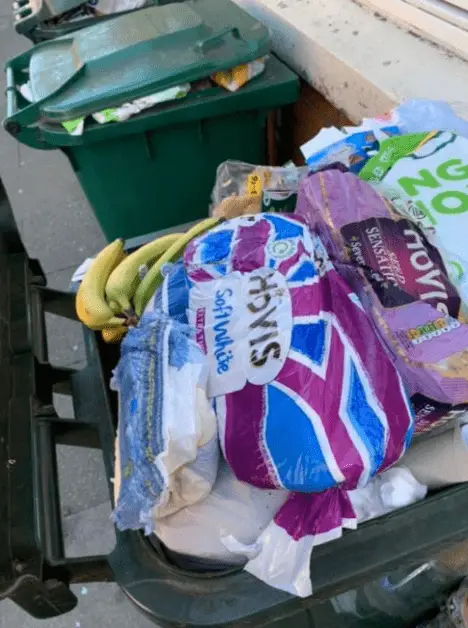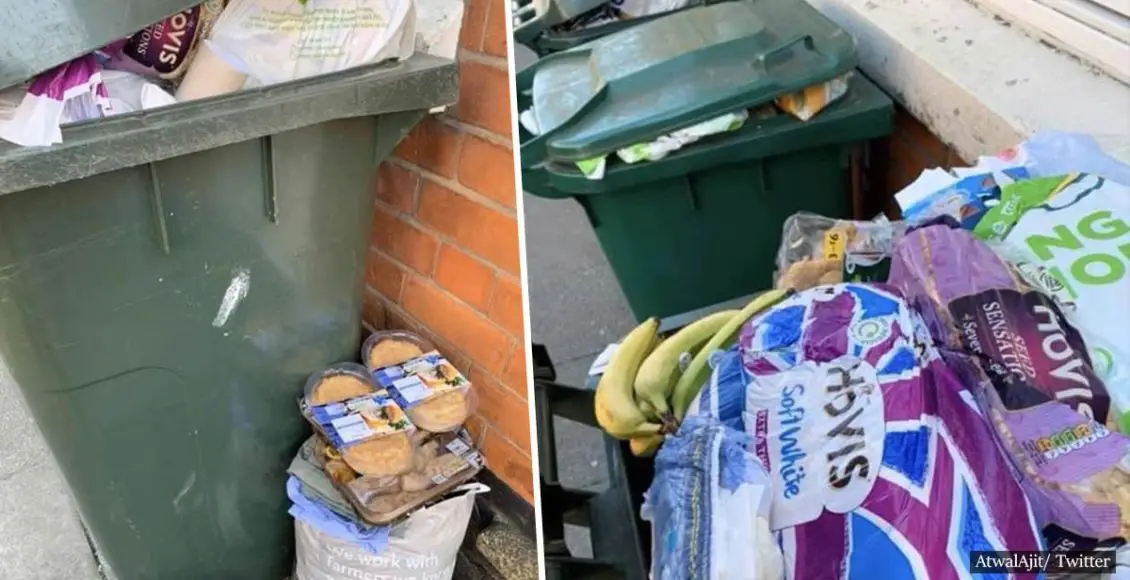Loaves of bread, unopened packs of meat, and fruits and vegetables have been carelessly dumped after the coronavirus panic shopping.
Panicked shoppers have been recently discarding the fresh food they have been buying during the first days of the pandemic. In a Twitter post, Ajit Singh Atwal shares photos showing rubbish bins in Derby overflowing with out-of-date food.
to all the people in this great city of ours in Derby, if you have gone out & panic bought like a lot of you have & stacked up your houses with unnecessary items you don’t normally buy or you have bought in more food than you need, then you need to take a good look @ yourself pic.twitter.com/fpYdGBu6M4
— Ajit Singh Atwal (@AtwalAjit) March 27, 2020
Mr. Atwal, a former Liberal Democrat Councillor, shares:
“To all the people in this great city of ours in Derby, if you have gone out & panic bought like a lot of you have and stacked up your houses with unnecessary items you don’t normally buy or you have bought in more food than you need, then you need to take a good look at yourself.”

The post quickly went viral as many people were furious, calling out the behavior of the stockpilers.
Additionally, similar scenes were reported across the country, including Frankby, Merseyside. Many netizens are certain that something needs to be done against throwing such great amounts of food.
This horrific trend comes as Britons are told to only leave the house once a day. Shopping is allowed only for essentials. What’s more, supermarkets are offering elderly customers priority time slots. They are also cutting down the number of people who can shop in the store at the same time.
to all the people in this great city of ours in Derby, if you have gone out & panic bought like a lot of you have & stacked up your houses with unnecessary items you don’t normally buy or you have bought in more food than you need, then you need to take a good look @ yourself pic.twitter.com/fpYdGBu6M4
— Ajit Singh Atwal (@AtwalAjit) March 27, 2020
All the assurances from the UK government and the industry, that there is still plenty of food and supplies for everyone didn’t stop panicked people from over-shopping at the beginning of the pandemic.
According to Mail Online, during the last half a month, Britons have stockpiled food worth £1billion, as a result of panic buying.
To avoid further complications, Tesco’s CEO, Dave Lewis, is encouraging people to free-up delivery slots for online orders to the elderly and vulnerable, and to go to stores instead.
However, this means that queues outside the supermarkets will continue to elongate, as shoppers are obligated to keep distance while waiting to enter the stores. Lewis wrote in a letter to his customers:
“Our social distancing plans aim to protect customers from the moment they enter our car parks, to browsing products, to paying and finally exiting our stores.”
Stephen Powis, the NHS England national medical director, accused panic buyers of depriving healthcare staff of the food supplies they need, saying: “Frankly we should all be ashamed.”
Plenty of people agree with the director’s position on the subject.
The online supermarket Ocado has been working at full capacity throughout the crisis.
Currently, online orders have been limited to one per week, per person, with some items been limited to only two per customer.
The chief executive, Lord Stuart Rose, pleads customers to shop rationally, revealing the shocking £1billion worth of wasted food over the past fortnight.
Rose himself has self-isolated after suspecting he had contracted the virus. He genuinely calls on people in the country to ‘make your meals work’.
“You can make a relatively small amount of food go a long way and I think we live in a very profligate society today – we buy too much, we eat too much, we consume too much and we have to learn new ways.”
Similar to Tesco’s CEO, Sainsbury’s chief executive Mike Coupe wrote a letter to his customers. There, he explains that the number of people in stores and at ATMs at any one time will be limited. He adds that queuing systems will be put in place outside stores. Furthermore, people are urged to arrive at the stores throughout the day, to avoid long queues forming in the morning. Moreover, he encourages people to pay by card, to limit physical contact. Coupe continues:
“We will be reminding people in stores to keep a safe distance from other customers and from our colleagues.”
Additionally, Sainsbury’s chief executive admits that many customers have reported that they are struggling to book online delivery slots. To these reports, he answers:
“We are doing our absolute best to offer online delivery slots to elderly, disabled and vulnerable customers. These customers have priority over all slots. Our customer Careline has been inundated with requests from elderly and vulnerable customers – we have had one year’s worth of contacts in two weeks. We have proactively contacted 270,000 customers who had already given us information that meant we could identify them as being in these groups.”
By March 30, the total coronavirus cases are 19,522, with 1,228 deaths.
A senior government adviser suggests that the figures would continue to rise for at least the next three weeks. This means the pandemic is likely to hit its peak at Easter. The adviser says that the UK hospitals should be able to handle the situation, but admits they can’t guarantee it. He adds:
“I expect death numbers to increase over two, three or four weeks, and then to gradually decrease.”






